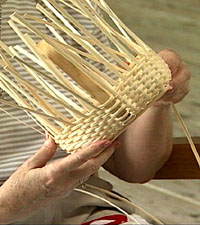Basket Makers Weave Pleasure With Profit
Basket Makers Weave Pleasure With Profit

Five years ago, the Bluegrass Area Extension Homemakers sponsored a basket making seminar. They were thrilled when it drew 30 participants.
Apparently the participants were pretty excited, too – this year's seminar drew 150 people.
"After that first year we met with homemaker leaders and asked ‘should we try again' and decided ‘yes, one more year,'" said Betty Overly, Bourbon County Cooperative Extension Agent for Family and Consumer Science.
This is the fourth year the seminar has been held at the Kentucky Leadership Center near Lake Cumberland in south central Kentucky. University of Kentucky Cooperative Extension Service agents serve as advisors.
"We feel like this is a great help to a lot of people," said Cheryl Case, Harrison County Cooperative Extension Agent for Family and Consumer Science. "It's a creative outlet for participants, and it's a relaxing place where they can receive instruction, be with other basket makers, and buy supplies."
Vendors from five states offered supplies on-site. Instructors came from Michigan, Tennessee, Indiana, North Carolina, Kentucky, Ohio, and Massachusetts.
While many attendees wove baskets for pleasure, some viewed it as a way to add money to the family bank account.
"A few of these ladies are farm wives trying to supplement their family's income," said Case. "But of course, there's a rich tradition in Kentucky for basket making and I think all our participants want to keep that heritage alive by passing skills along to the next generation."
"Most of these people do it because they enjoy it," said Judith Olney, an instructor from Rowley, Mass. "Some will go on to become instructors, but a few will go into selling."
According to Olney, competition from large chain stores makes it more challenging for local basket makers to see large profits. But she said baskets that are unique and individualized will continue to find markets.
"Baskets will sell a little better in places with a tradition like Kentucky, but they'll sell for higher prices in the art markets of the larger urban places such as New York," Olney said. "There are also some excellent galleries in larger cities such as St. Louis and Detroit."
Olney, who specializes in shaping techniques for baskets based on the Shaker tradition, said about 80 percent of the baskets made at the Seminar use reed imported from Asia.
"When you get into ash or oak or honeysuckle the preparation is so difficult that they have to be expensive," said Olney.